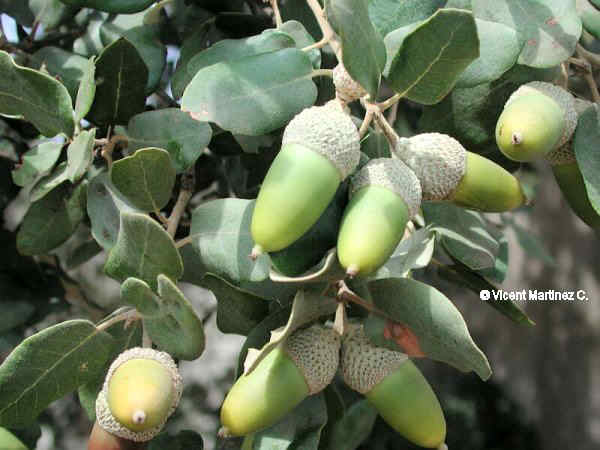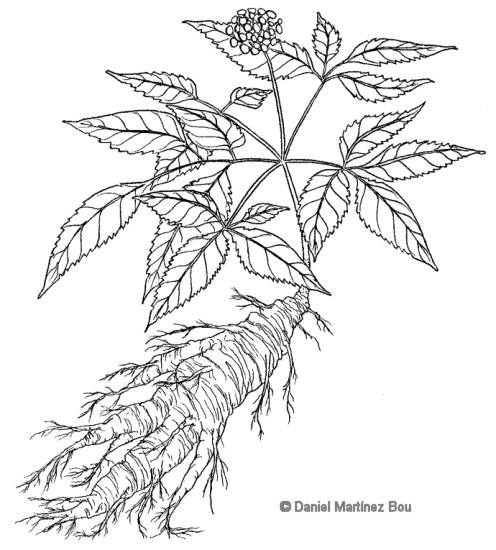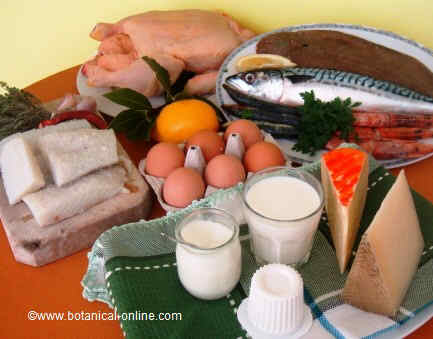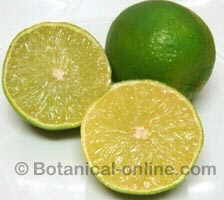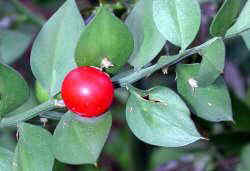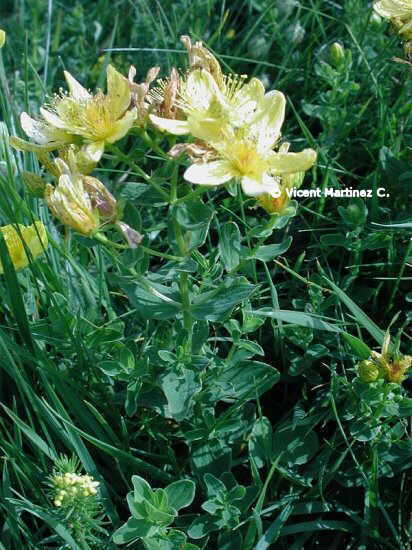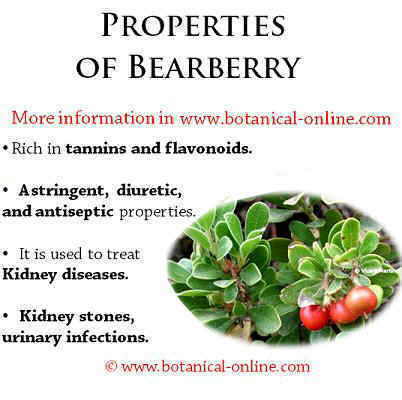Contents
- 1 Benefits of mustard seeds
- 1.1 MEDICINAL PROPERTIES OF MUSTARD
- 1.2 Topical use of mustard preparations
- 1.3 HEALING MUSTARD REMEDIES
- 1.4 Mustard for rheumatic diseases
- 1.5 Mustard for colds and chest congestion
- 1.6 Mustard for Raynaud’s disease
- 1.7 Other mustard applications in external use
- 1.8 MEDICINAL PROPERTIES OF MUSTARD SEEDS FOR EXTERNAL USE
- 1.9 Emetic effects of mustard seeds
- 1.10 Diuretic effects of mustard seeds
- 1.11 Mustard gas and the beginning of chemotherapy
- 1.12 REMEDIES PREPARED WITH MUSTARD
- 1.13 Instructions for making and applying a poultice of mustard
- 1.14 Mustard plaster or poultice
- 1.15 MUSTARD MEDICINAL SPECIES
Benefits of mustard seeds
MEDICINAL PROPERTIES OF MUSTARD
Mustard is a very popular plant for its use in food, as its seeds are ground and incorporated into numerous sauces that are used as a condiment, among which is the mustard sauce. But the truth is that, formerly, the properties of mustard were used for many more purposes, beyond to flavor the food. There is a very extensive bibliography that tells us about the medicinal uses of mustard.
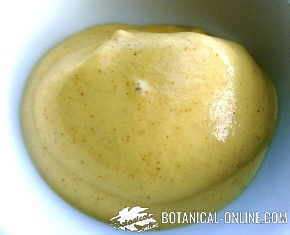 Photo of white mustard sauce (Sinapis alba). White mustard has round and yellow seeds and it is the one that is usually used for medicinal purposes. There is also black mustard, with dark-colored seeds
Photo of white mustard sauce (Sinapis alba). White mustard has round and yellow seeds and it is the one that is usually used for medicinal purposes. There is also black mustard, with dark-colored seeds
Topical use of mustard preparations
Preparations with mustard have a salutary effect, heating and drawing blood to a localized area (which has been applied a poultice or mustard plaster) and providing a painkilling effect.
However, due to the irritant oils of mustard, topical use can cause skin burning and blistering.
Caution: Please follow the instructions to prepare remedies with mustard found at the end of this page to avoid adverse effects.
HEALING MUSTARD REMEDIES
Mustard for rheumatic diseases
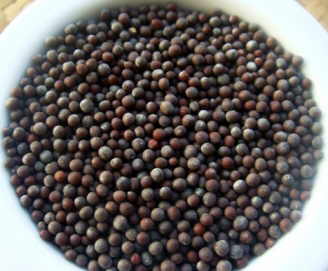
Photo of black mustard seeds (Brassica nigra)
In ancient Greece, mustard was highly valued for its medicinal properties to treat arthritis and rheumatism. Poultices for such purposes are used, ie, topical applications as poultices or compresses, made from mustard flour. (The gender word for this plant, sinapis, comes from the Greek sinapism, meaning mustard). The therapeutic action of mustard is due to its content of glucosinolates, mainly sinigroside.
These components have rubefacient and irritating effect on the skin, causing a strong vasodilation of cutaneous capillaries. Vasodilation leads to increased irrigation, which helps eliminate toxins and relieve local pain. Mustard poultices are recommended for people with sciatica, muscle aches and pains such as arthritis or rheumatic neuralgia.
Mustard for colds and chest congestion
Mustard plasters (mustard poultices) represented one of the oldest natural remedies to treat colds and lung congestion, until the advent of antibiotics. The first records about the use of mustard for this purpose are in Dioscórides treaties.
A mustard poultice applied to the chest area to clear it, when the patient has bronchial catarrh, mild flu, or respiratory diseases. This type of remedy is also used to treat asthma, in which case you should first consult a doctor and take care that the patient does not inhale the flour and mustard essential oil.
Mustard for Raynaud’s disease
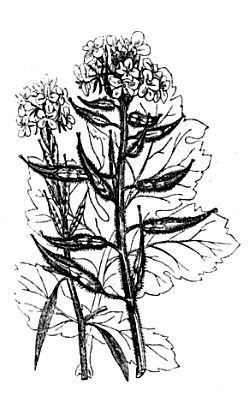 Illustration of two types of medicinal mustard: Common mustard (Brassica nigra) (left), and white mustard (Sinapis alba) (right). White mustard is distinguished in that it has villi in its stem and leaves
Illustration of two types of medicinal mustard: Common mustard (Brassica nigra) (left), and white mustard (Sinapis alba) (right). White mustard is distinguished in that it has villi in its stem and leaves
Mustard, as a rubefacient remedy, helps activate the circulation of the peripheral areas of the body and has been used for many years as a remedy for Raynaud’s disease, along with other herbs with the same effect as horseradish or ginger.
One mustard plaster on fingers or sleeping areas can be applied as symptoms appear. You can also apply a sinapized footbath if symptoms are affecting the toes. (The sinapized footbath consists of a mixture of hot water with salt in which mustard flour has been added)
Other mustard applications in external use
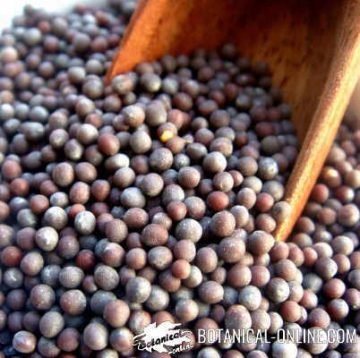 Photo of Indian mustard (Brassica juncea)
Photo of Indian mustard (Brassica juncea)
- Foot fungus or ringworm: Sinapized foot baths or foot baths with mustard have been used to treat foot ringworm, nail fungus and athlete’s foot. Modern scientific studies confirm that mustard contains up to 8 antifungal and antibiotic components, including allyl isothiocyanate present in the essential oils of this plant..
- Tired feet: Sinapized foot baths help relieve pain and tireness to your feet by means of treating poor circulation in the feet. In the United States there are mustard creams to treat tired feet.
- Hypertension: Peripheral vasodilatation caused by footbaths with mustard promotes blood circulation throughout the body, helping to reduce blood pressure.
- Migraines: There is a traditional remedy for headache which involves making mustard baths or foot baths. Vasodilation caused by mustard draws blood to the feet and decongest the head. They are specially a good remedy to treat headaches caused by flu, seasonal changes or wind.
- Dysmenorrhea and amenorrhea: Sinapized foot baths are also used to treat women with irregular periods or absence of menstrual cycle. Its action is produced because mustard helps activate circulation in the legs and relieves menstrual pain.
MEDICINAL PROPERTIES OF MUSTARD SEEDS FOR EXTERNAL USE
Mustard is not usually used in internal medicine due to its strong irritant properties. Although it is used as a condiment in sauces in very small amounts. For internal medicinal purposes white mustard (Sinapis alba) is used.
Common mustard (Brassica nigra) is not recommended for internally medicinal use.
- Appetizer: small amounts of mustard increase appetite by stimulating the secretion of saliva and gastric juices. Take half a teaspoon (approximately 10 seeds) of mustard seeds with a glass of warm milk 15 minutes before the meal. Treatment with mustard is irritating and prolonged use is not recommended. It is recommended to consult other Phytotherapy to increase appetite when making long treatments.
- Laxative: Mustard can also have a laxative effect because it irritates the lining and stimulates the digestive system (1 teaspoon of seeds, up to 2 times a day). It should not be taken regularly as it can seriously damage the digestive tract. See: Plants with laxative properties.
Emetic effects of mustard seeds
Mustard was formerly used as a emetic remedy. The remedy was based on the strongly irritant properties of mustard, which ingested in moderate doses is enough to cause severe vomiting. The components of mustard stimulate gastric nerve, which in turn sends the brain nerve this emetic stimulus, causing almost immediate vomiting after taking it.
This remedy was formerly used in case of poisoning. Vomiting occurred because the rapid expulsion of the toxic substance. (Dose of 1 teaspoon (15g) with 1 cup of warm water taken once
Caution !!! It is very irritating and should NOT be done because it can cause serious damage throughout the digestive tract.
Diuretic effects of mustard seeds
Mustard seeds have a mild diuretic effect due to the sulfur containing components. However, an excess of these substances can cause inflammation of the urinary tract, so its use is not recommended for people with urinary diseases such as cystitis or kidney stones.
Presently these methods are not recommended because mustard irritates mucous tissues. These treatments can cause unwanted effects such as loss of sensation in the mouth, irritation and inflammation of the entire digestive tract (gastritis, oesophagitis), diarrhea, tenesmus (continued desire and difficulty of urinating) and even seizures.
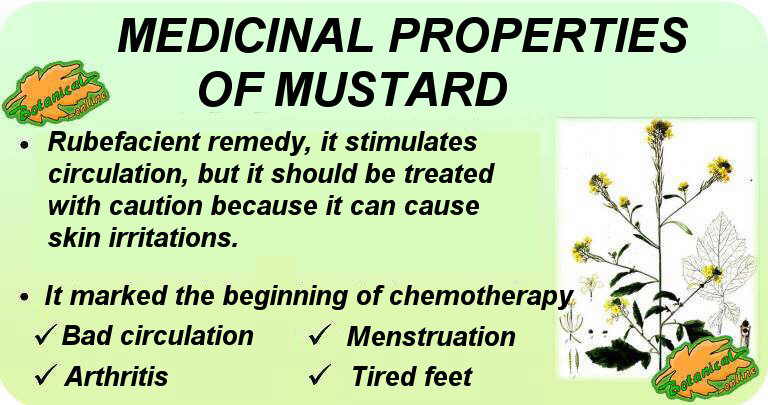
Properties and benefits of mustard and its main medicinal uses
Mustard gas and the beginning of chemotherapy
During World War I, mustard was used to make mustard gas. This consisted of a gas prepared from mustard, sulfurized or nitrogenized, by chemical methods. It was one of the lethal weapons of chemical warfare, considered cytotoxic (causing cell death) and blistering (which causes painful blisters on the skin).
This weapon was used to incapacitate the enemy as inhalation damages the lungs (to cause suffocation), incapacitates vision (can cause blindness) and contact with the skin causes blisters and severe burns.
However, the use of mustard gas resulted in the first effective anti-cancer drug: autopsies revealed that soldiers exposed to mustard gas had decreased lymph. Subsequent research has linked the use of mustard gas in the treatment of lymphoma (a tumor in the lymph cells), and developed the mustine (a derived from mustard gas), which proved to be an effective drug to treat this type of cancer. Until then, pharmacology was not able to slow the growth of a cancerous tumor, and this discovery marked the beginning of chemotherapy.
Currently, drugs derived from mustard gas (mechlorethamine, mustine, nitrogen mustard, etc.) are still used to treat leukemia and other cancers.
REMEDIES PREPARED WITH MUSTARD
REMEDIES FOR TOPICAL USE
Important note: The use of mustard can cause dermatitis, blisters and skin burns. It is therefore important to take caution when applying such remedies, doses cautiously respecting and applying the remedy for a reasonable time.
- Sinapized foot bath: it is called so the foot bath with mustard. 1530g of mustard flour are prepared. in 1 liter of hot water for 10 minutes. It stimulates circulation and sweating, soothing remedy used to combat migraine or headaches effect. This method is also used to treat foot pain and menstrual problems. Contraindicated in people with varicose veins.
- Sinapized bath: a bag of cotton or other permeable material is prepared with 150g. mustard flour (200g. if whole grains are used) and this bag is immersed in a hot bath for 10 minutes. After 10 minutes, remove the bag from the water. Effective for rheumatic pain and headaches.
- Mustard compresses: Between 30 and 50g. of boiled mustard. Soak a cotton cloth and apply on the chest, back, or the area you want to perform the remedy. Do not use on nipples, face or sensitive areas of the body. Follow the same precautions as with mustard poultice:
- Mustard poultice (It is called sinapism) (From Greek “sinapis”, meaning mustard). Mustard poultices have calming effect on local pains like sciatica, muscle aches and rheumatic pain, arthritis or neuralgia. However, mustard has very irritating oils, and its use can cause skin burning.
Instructions for making and applying a poultice of mustard
It is important to follow these instructions on how to make and apply a poultice of mustard to avoid adverse effects.
Mustard plaster or poultice– External use – – Use beans of ground mustard or mustard flour. In children and the elderly, mix the mustard in the same proportion of flaxseed meal to be less irritating. – Mix with warm water to form a ‘paste’. The appropriate ratio for the mixture corresponding to 1 part mustard flour to 1 part water (half mustard flour and half of warm water). – Spread the paste wrapped in a cotton fabric so that mustard paste can not come into direct contact with the skin. – Apply the poultice on the chest, back or desired area for no more than 10-15 minutes. Do not apply in sensitive areas of the skin. – Remove the poultice as soon as the patient notices the effect of mustard plaster. Pain is an indicator that the poultice should be removed even before time if the patient indicates. – Clean the area with warm water and cover with a towel or clean cotton cloth. – If there has been irritation, cover the area with a cloth smeared with oil. – Two poultices can be applied as poultices as maximum per day, considering that this is a very irritating remedy to the skin and can not be used too often. PRECAUTIONS:
|
MUSTARD MEDICINAL SPECIES
There are two types of medicinal mustards: common mustard (Brassica nigra) and white mustard (Sinapis alba). The part used in both plants are their seeds in ground form or mustard flour.
- For external use: can be used both mustard species, the most recommended the common mustard (Brassica nigra) to have a more potent effect rubefaciente.
- For internal use: remedies with common mustard are not recommended, because it contains substances that irritate the digestive mucosa. However, white mustard (Sinapis alba) has a less irritating effect and therefore it is more suitable.Common mustard is totally contraindicated as an internal remedy !!!
![]() More information on mustard.
More information on mustard.

